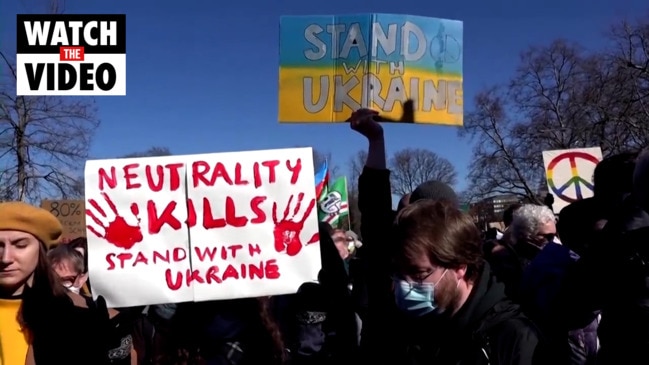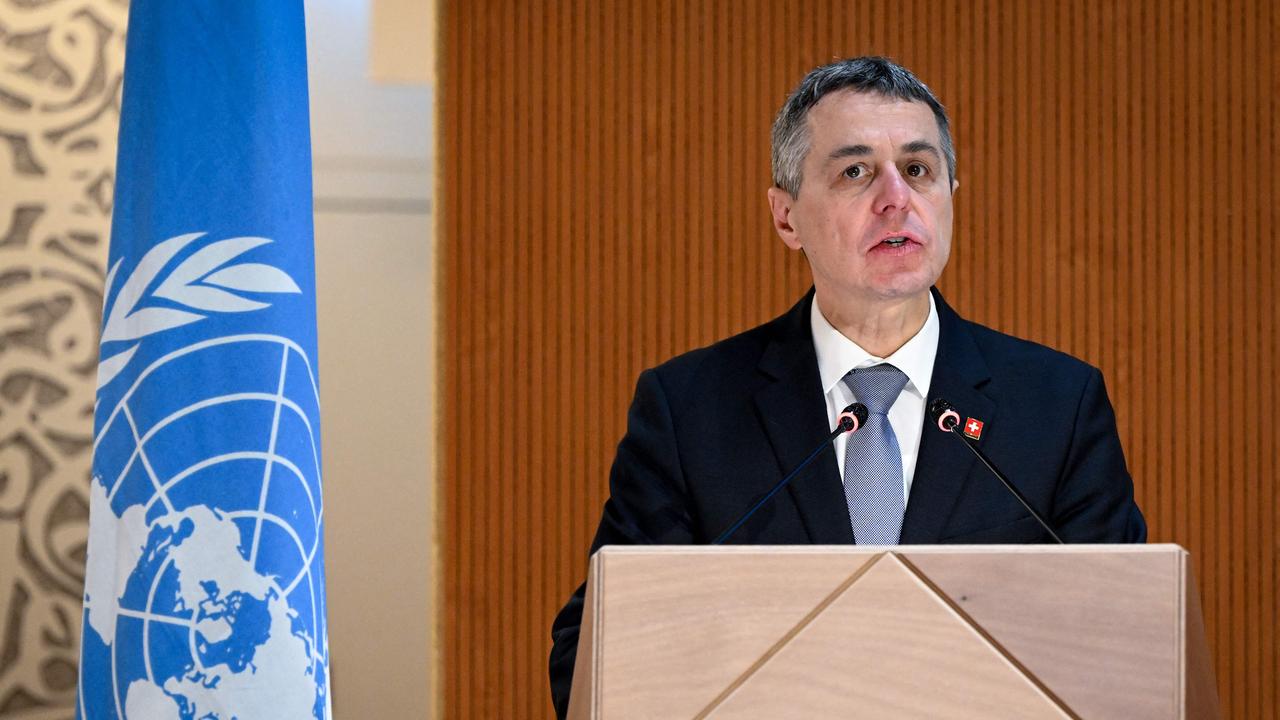Traditionally neutral Switzerland adopts sanctions against Russia
Traditionally neutral Switzerland has taken action against Russia, with its leader saying it is a “big step” for the European country.

Traditionally neutral Switzerland will adopt all the sanctions already imposed by the EU on Russia over its invasion of Ukraine, including against President Vladimir Putin.
“This is a big step for Switzerland,” Swiss President Ignazio Cassis told a press conference, after the Alpine nation had for days hesitated over whether to join the international move to sanction Moscow over the attack on its neighbour.
As the European Union last week slapped Russia with biting sanctions after Moscow launched its full-scale invasion of Ukraine, Bern only said it would ensure that those penalties could not be circumvented via Switzerland.
But following a government meeting Monday, Switzerland announced it was now fully on-board with the sanctions.
“Switzerland will implement the sanctions in co-ordination with the EU,” the government said in a statement, adding that these were “primarily goods and financial sanctions”.
But they also included the freezing of the assets of persons and companies. In particular, the government said Switzerland would with “immediate effect” impose the sanctions already imposed by the EU on Putin, Prime Minister Mikhail Mishustin and Foreign Minister Sergei Lavrov.
Stream the latest news on the escalating tensions between Russia and Ukraine live & on demand on Flash. 25+ news channels in 1 place. New to Flash? Try 1 month free. Offer ends 31 October, 2022 >

‘Responsible’
“In so doing, Switzerland is responding to the serious violations of international law for which these individuals are responsible,” it said.
The announcement came as Russia’s mission in Geneva said that Lavrov had been forced to cancel his trip to the Geneva-based United Nations Human Rights Council due to the “anti-Russian sanctions” imposed by EU countries.
The Swiss government said Monday that it would also close Swiss airspace to all flights from Russia and to all movements of aircraft with Russian markings, except for flights for humanitarian, medical or diplomatic purposes.
Swiss Justice Minister Karin Keller-Sutter meanwhile told reporters that five oligarchs close to the Russian president and who had strong ties to Switzerland had been banned from entering the country.
And Bern said it had decided to partially suspend a 2009 agreement on visa facilitation for Russian nationals, although holders of diplomatic passports would still be permitted to enter Switzerland without a visa.
Switzerland had come under increasing pressure to get in line with the EU and US sanctions against Russia, with nearly all political parties backing the move.
‘Very good news’
EU foreign policy chief Josep Borrell hailed Monday’s decision, saying it was “very good news” that Switzerland would “fight against corruption and the dark money... of the oligarchs who support Putin and who are being targeted by sanctions.” “Without the participation of Switzerland, our measures would have been not as effective as needed,” he told reporters.
Russia may only rank 23rd on Switzerland’s list of trading partners, but the Alpine country’s banks are often favoured by Russia’s ultra-rich.
According to statistics from the Bank for International Settlements, Swiss banks had in the third quarter last year some $23 billion in Russian holdings, mostly from deposits.
The majority of Russia’s oil business passes through Switzerland, while its cereals and metals are also traded in Geneva.
Switzerland’s economic affairs minister, Guy Parmelin, acknowledged that Switzerland would face consequences of the sanctions, and of the Ukraine conflict itself.
He said the Nord Stream 2 company had been forced to lay off the entire workforce at its Swiss headquarters after Germany last week suspended its approval of its pipeline built to bring Russian gas to Europe.
“That is more than 140 people who have been fired,” he told the RTS public broadcaster.
The company did not immediately respond when asked to confirm the lay-off. Before shifting its approach, Bern said it had carefully considered “Switzerland’s neutrality and peace policy considerations”, but that “Russia’s unprecedented military attack on a sovereign European country was the deciding factor”.
Bern stressed though that it remained willing to “actively contribute to a solution to the conflict through its good offices”.



